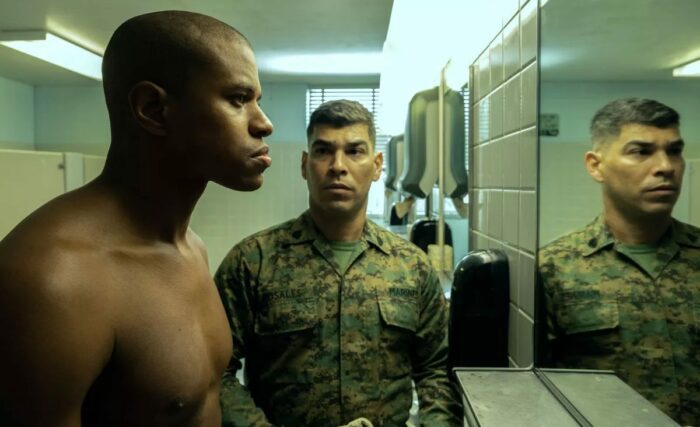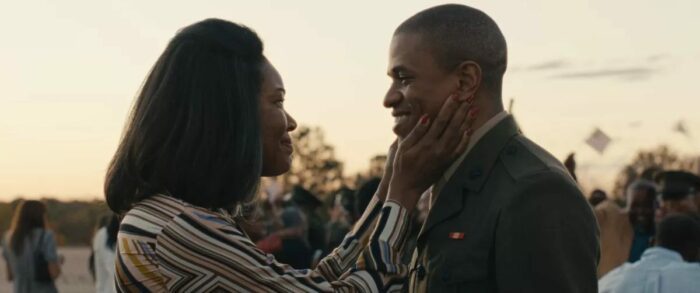Seen one boot-camp movie—from the frothy Private Benjamin to the earnest Heartbreak Ridge to the harrowing Full Metal Jacket and dozens more before, since, and in between—seen them all, right? The rogue recruit, the sadistic instructor, the rigorous physical training, the hazing by peers, the eventual triumph-above-all-odds-to-earn-the-respect-of-the-squad-and-its-command? Despite their hoary tropes, basic-training films can make for excellent cinema, and writer-director Elegance Bratton has his own story to tell in The Inspection, a remarkable work of prejudice and persistence that should earn viewers’ respect and admiration.
Bratton’s first feature film is based on his own experience as a young gay Black man in the early aughts as he commits to joining the Marines. It’s an intense, moving experience, another in A24‘s long line of surprising successes, and a film that takes its depiction of boot camp seriously. While it doesn’t really stray from the conventions of the subgenre, its autobiographical nature makes The Inspection a truly moving film, the first to my knowledge about a gay man navigating the physical rigors and toxic masculinities of basic training. (In fact, I can only recall a handful of films depicting the conflicts LGBTQ characters face in the military broadly.)
Bratton, who over the last decade since earning his MFA from New York University’s Tisch School of the Arts for directing and writing, has directed several short and documentary films about LGBTQ+ people and topics, served himself in the Marines, enlisting after having spent years in homelessness. If from homelessness to Marine to NYU MFA to A24 director is not a remarkable story, I don’t know what is.
The Inspection is based on his own experience, though not strictly a memoir: the protagonist whose life mirrors Bratton’s own is here named Ellis French and played by Jeremy Pope (Jackie Wilson in One Night in Miami), newly freed from jail and out on the streets. Needing his birth certificate so he can enlist, he knocks on his straight-arrow single mother’s door and is met with a frosty “Are you in trouble?” The mother’s cold, distant reserve doesn’t thaw, even in the slightest, when she learns the reason for his request. As Inez, Gabrielle Union keeps her lips tight and shoulders square as she sizes up the young man in front of her.
At first, one might ascribe her distant, reserved reactions as a resentment or distrust for a son who’s spent his last years in jail. There’s no love, certainly, in her small apartment. But when she yields the document, she declares she considers it, if he continues the path he’s been on, “null and void.” It’s an astonishing, powerful rejection, humiliating and dispiriting. And Union makes it clear Inez is concerned not about the time Ellis has spent in jail or the behavior that brought him there, but one thing, and one thing only: his sexual orientation.
I could scarcely believe her reaction at first, but those of us who are straight have never had to come out to a parent and risk their love; Inez’s harsh rebuke is one that stays with Ellis—and the audience—throughout the film. I could not help but think of the recent comments made by the parent of the alleged Colorado Springs shooter expressing his relief that his son was not gay—days after his attack on LGTBQ+ bar that killed five and wounded 17. Homophobia runs deep.
It runs through the military, too, especially in the “Don’t-Ask-Don’t-Tell” era, as Ellis finds out. He seems an unlikely candidate for the Marines with his soft-spoken demeanor and slump-shouldered posture. But with no options for the future, he enlists nonetheless.

And in basic training he endures not just the grueling routines familiar to filmgoers, but the deep-seated prejudice of the era pervasive in the Marines’ hierarchy. His soft-spoken demeanor makes him a target of bullies eager to express their machismo by demeaning others. And, of course, he runs up against a drill sergeant ready to bust his balls. The Inspection does not disappoint in offering up everything one expects from a boot-camp film. But Ellis manages, despite the hostilities he faces, to survive.
There’s also no shortage of latent homoeroticism between Ellis and other characters where one might least expect it. But perhaps most surprisingly, the film ultimately embraces the military as a source of the earned camaraderie and support a younger Ellis could never find in his family or on the streets. Pope is excellent as a young man who, in his officer’s words, can queer anything, but commits to his enlistment wholeheartedly. So is Union, even if she’s onscreen only at the film’s start and end, in a frosty, conflicted role as a mother whose prejudice runs every bit as deep as her love.
I’ve always been impressed with Union, not just as a charismatic young actress who could carry a cheer series but as a more mature woman willing to speak out and use her platform on issues that matter to her and her loved ones. In particular, in the wake of the rape allegations that came to light upon the release of director-star Nate Parker’s Birth of a Nation, she penned a powerful op-ed revealing her own history as a victim of sexual assault.

In The Inspection, Union is onscreen only for a small portion of the film’s running time. It may or may not be enough to earn her her first Academy Award nomination. But the film, ultimately, is Elegance Bratton’s. It’s his story. His life. And ultimately, his truth. And a powerful, fascinating boot-camp film that brings a new and much-needed perspective to a genre normally defined more by its tropes than its revelations.



